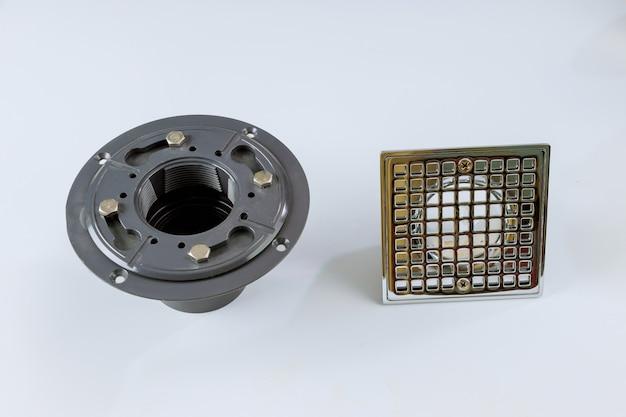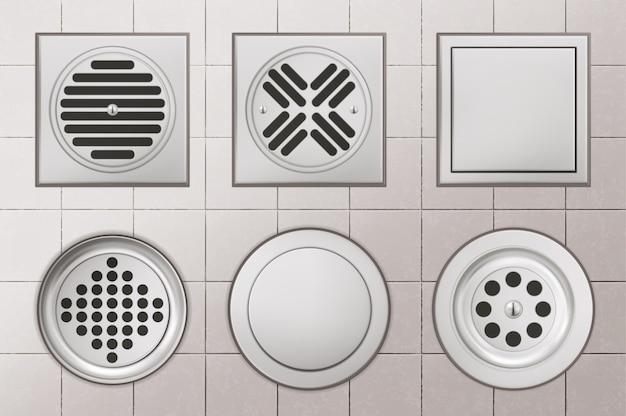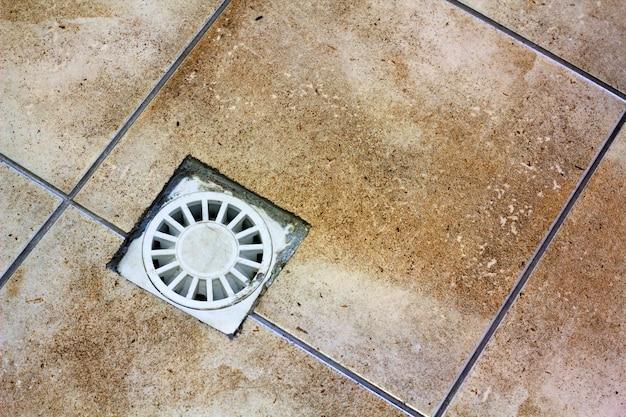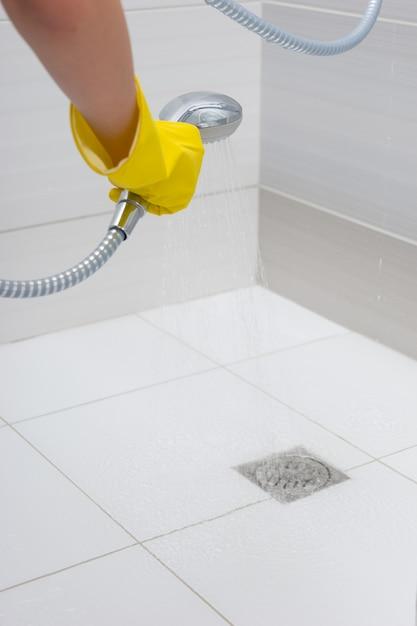Have you ever encountered water seeping through your floor drain and flooding your basement or laundry room? It’s a frustrating and messy problem that can cause extensive damage to your property. If you’ve experienced this, you’re not alone. Many homeowners face the issue of water backing up through their floor drain, especially during heavy rainfall or snowmelt.
A basement floor drain may become clogged with debris, dirt, or soap scum, which blocks the drain and causes water to back up. However, several other reasons could cause water to come up floor drain, ranging from a blocked sewer line to damaged pipes. Therefore, identifying the root cause of this problem is essential to prevent water damage and protect your property.
In this comprehensive blog post, we will dive deep into the possible causes of water coming up floor drain and provide practical solutions on how to address the issue. We’ll cover everything from basement floor drain filled with dirt to floor drain backing up after rain and how to stop water coming up your floor drain. So let’s get started!
Water Coming Up Floor Drain: Causes and Fixes
Water coming up a floor drain can be a headache to homeowners because it can cause significant damage to your house’s foundation, causing mold and water damage issues. Here’s what you need to know about the cause of water coming up the floor drain and how to fix it.
Causes
Several factors can cause water to come up from a floor drain; they include:
Clogged Pipes
If water backs up from your floor drain, it might be because of a clogged pipe. Waste, dirt, debris, and other materials that go down the drain may build over time and ultimately clog the pipes, making it difficult for water to flow freely.
Damaged Sewer Line
Another issue that might cause water to come up from a floor drain is a damaged sewer line. Debris and soil can enter and damage pipes; roots from trees nearby can also cause significant damage to the sewer line, resulting in water backing up through the floor drain.
Heavy Rainfall
During heavy rainfall, an overwhelmed sewer system can force water coming up the floor drain, causing a backup.
Fixes
Contact a Professional
If you suspect there’s an issue with your pipes or the sewer line, contact a professional plumber to help diagnose and fix the problem.
Regular Cleaning and Maintenance
Regular cleaning and maintenance of pipes and sewer lines can prevent water backup through the floor drain. If you’re frequently experiencing water coming up the floor drain, consider hiring professionals to have the sewer lines cleaned frequently.
Backwater Valve Installation
Installing a backwater valve can help prevent water backup, especially during heavy rainfall. The valve is designed to automatically close if the sewage flows backward, preventing water from coming up the floor drain.
In conclusion, water coming up from a floor drain can be an unpleasant experience, but it doesn’t have to be a recurrent problem. Regular maintenance, installation of a backwater valve, and contacting professional plumbers in case of significant damage to the pipes or sewer line are ways to mitigate this issue.
When Water Comes Through the Floor Drain
If you’re experiencing water coming through the floor drain in your home, it’s natural to feel worried and confused. Here are a few things you should keep in mind:
Possible Causes of Water Coming Through the Floor Drain
There could be many causes of water coming through the floor drain:
- A clogged drain pipe
- A sewer backup
- Heavy rain or melting snow
- High water table
- Plumbing issues
The first step is to identify the root cause of the problem so that you can take proper action.
Steps to Take When Water Comes Through the Floor Drain
Here are some steps you can take if you notice water coming through the floor drain:
- Turn off all water sources to prevent more water from entering the drain system.
- Inspect the area surrounding the floor drain to see if you can locate the source of the water.
- Try to clear any obstructions, such as hair, soap scum, or grease, from the drain.
- If the issue persists, try using a plunger or an auger to loosen any blockages.
- Call a professional plumbing service to inspect and fix any underlying issues.
How to Prevent Water Coming Through the Floor Drain
There are several steps you can take to prevent water from coming through the floor drain:
- Regularly clean and maintain your drains to prevent blockages.
- Install a backwater valve to prevent sewer backups.
- Check your sump pump to ensure it’s working correctly.
- Install a dehumidifier in your basement to reduce humidity levels and prevent water damage.
Water coming through the floor drain can be concerning, but it’s essential to identify the cause of the problem and take action quickly. By following the steps mentioned above and taking preventative measures, you can avoid this issue in the future.
Floor Drain Backing Up After Rain
As a homeowner, there’s nothing more frustrating than dealing with a floor drain backing up after a heavy rainfall. This problem is not only annoying to deal with but can also be a health hazard. Here are some reasons why your floor drain may be backing up after rain, and what you can do to fix it.
Inspect the Drain
One of the first things you should do if you have a floor drain backing up after rain is to inspect the drain itself. Look for any visible signs of damage, such as cracks or rust. If you notice any damage, it’s important to get it fixed as soon as possible to prevent further problems.
Check the Downspouts
Another common reason for floor drain backups is clogged downspouts. If your downspouts are clogged, rainwater won’t be able to properly drain away from your home, causing excess water to pool around the outside of your foundation. This can cause hydrostatic pressure to build up, pushing water into your basement or crawl space through the floor drain.
Repair Any Foundation Issues
If you’ve checked your drain and downspouts and still have a floor drain backing up after rain, it’s possible that you have foundation issues. Over time, the foundation can shift and settle, leading to cracks or other damage that can cause water to seep into your home through the floor drain. It’s essential to address any foundation issues as soon as possible to prevent further damage.
Schedule Regular Maintenance
The best way to prevent floor drain backups is by scheduling regular maintenance for your home’s plumbing system. This includes cleaning your drains and downspouts, inspecting your foundation for damage, and making any necessary repairs.
In conclusion, a floor drain backing up after rain is a frustrating problem to deal with, but by taking the right steps, you can prevent it from happening in the future. Regular maintenance and inspections of your plumbing system can go a long way toward keeping your home dry and healthy. If you’re still experiencing problems, don’t hesitate to contact a plumbing professional for assistance.
Basement Floor Drain Filled With Dirt
Basement floor drains are designed to prevent excess water from flooding the basement and damaging property. However, when dirt accumulates in the floor drain, it can cause problems and potentially lead to flooding. Here are some ways to deal with a basement floor drain filled with dirt.
Clean the Drain
The first step is to remove any standing water in the drain using a sump pump or a wet-dry vacuum. Next, use a plumbing auger or a drain snake to remove any visible dirt, debris, or roots that may be obstructing the drain flow. If that doesn’t work, try using a high-pressure water jet to blast the dirt out. Make sure to wear gloves and protective gear when doing this to avoid injury.
Install a Drain Strainer
To prevent dirt and debris from accumulating in the drain, install a drain strainer. A drain strainer is a small metal or plastic device that fits over the drain and catches any debris that may fall into the drain. It’s easy to install and can be removed and cleaned periodically to keep the drain free from dirt.
Use Enzyme Cleaners
Enzyme cleaners are a natural and effective way to keep drains clean and clear of dirt and debris. The enzymes in these cleaners break down the organic material that accumulates in the drain, preventing clogs and foul odors. Pour the cleaner down the drain and let it sit for the recommended time before flushing the drain with hot water.
Hire a Professional Plumber
If the dirt buildup in the basement floor drain is severe, it may be time to call in a professional plumber. A licensed plumber can inspect the drain and use specialized equipment to remove the dirt and debris clogging it. They can also install a backflow preventer or sump pump to prevent future flooding.
In conclusion, dealing with a basement floor drain filled with dirt requires some effort and attention. By cleaning the drain regularly, installing a drain strainer, using enzyme cleaners, or hiring a professional plumber, homeowners can prevent water damage and keep their basements clean and dry.
What Causes Water to Back Up in Floor Drain
If you’ve ever had the unfortunate experience of having water back up in your floor drain, then you know what a hassle it can be. Here are some common reasons why water might be backing up in your floor drain:
Clogged Drain Pipes
One of the most common reasons why water backs up in a floor drain is due to clogged drain pipes. This can happen for a variety of reasons, from a buildup of grease, hair, and other debris to tree roots growing into the pipes. Clogged drain pipes can often be resolved with the help of a plumber or drain cleaning service.
Improper Drainage System Design
If the floor drain is unable to handle the volume of water it receives, this could be a sign of an improper drainage system design. The drain could be undersized or improperly positioned, leading to water backing up. This can be a more complicated issue to resolve, and you may need to consult with a professional.
Sewer Line Blockage
A sewer line blockage can also cause water to back up in a floor drain. This might be due to a tree root invasion, a collapsed or broken pipe, or a buildup of debris in the sewer line. This is a much more serious issue that requires immediate attention from a professional plumber or sewer specialist.
Plumbing System Malfunction
Finally, a malfunction in your plumbing system could also cause water to back up in your floor drain. This could be due to a malfunctioning sump pump, a broken sewer line, or a malfunctioning septic system. In any case, it’s important to address the problem as soon as possible to prevent further damage to your home.
In conclusion, there are many reasons why water might be backing up in your floor drain, and it’s important to identify the underlying cause to prevent further damage. Whether it’s a clogged drain pipe or a more serious issue like a sewer line blockage, addressing the problem quickly is key to preventing the situation from getting worse. If you’re unsure of what might be causing the problem, don’t hesitate to contact a professional for help.
How to Stop Water from Coming Up Your Floor Drain
Dealing with a floor drain backup can be a significant headache for any homeowner. Besides the inconvenience, it can cause costly damage to your property and lead to health hazards. In this section, we explore some hacks to prevent water from coming up your floor drain.
Install a Backwater Valve
A backwater valve is a simple device that prevents wastewater from flowing back into your home. It works by allowing water to flow out but automatically shuts off when the drainage reverses. Installing a backwater valve is a practical solution that can save you from costly damages. You should consider hiring a professional plumber to install the backwater valve for the best results.
Maintain Your Floor Drain
Floor drains inevitably accumulate debris, hair, and other waste materials that cause backups. It is crucial to keep them clean and unclogged. You can start by having a drain cover to prevent larger particles from falling into the drain. Also, have a regular cleaning schedule to keep the drain clear of debris.
Install a Sump Pump
A sump pump is an excellent solution to prevent water from coming up your floor drain. It is a device that pumps out water from the sump pit located in your basement or crawlspace. If your floor drain is connected to the sump pit, the water will be drained out before it reaches the floor drain. This solution is perfect for areas with frequent water intrusion, such as those in flood-prone areas.
Check for Plumbing Issues
Plumbing problems such as cracked pipes, corroded fittings, and weak seals can cause your floor drain to back up. If you notice that the water is not flowing correctly or hear gurgling sounds in the pipes, it might be time to call a professional plumber. They can diagnose the problem and recommend the best solution, whether it involves simple repairs or a complete overhaul of your plumbing system.
In conclusion, dealing with water coming up your floor drain can be a nightmare, but it is preventable. By installing a backwater valve, maintaining your floor drain, installing a sump pump, and checking for plumbing issues, you can keep the water at bay and keep your home safe and dry.
Basement Drain Backing Up When Washing Clothes
Are you experiencing a frustrating issue of having your basement drain backing up whenever you wash clothes? You are not alone! This problem is common, and there are several reasons why it could be happening.
Clogged Drain
A clogged drain is the most common reason for the basement drain backing up when you wash clothes. Over time, dirt, grime, hair, soap, and other debris can accumulate and clog the drain. This buildup restricts the flow of water, leading to backups during the washing cycle.
Faulty Drain Line
A faulty drain line could also be the reason why your basement drain is backing up. If the drain line has cracks, breaks, or is damaged in any way, it can cause water to back up and flood your basement. A qualified plumber can assess the drain line and determine the cause of the problem.
Overloaded Septic System
If you have a septic system, an overloaded system can also cause backups in your basement drain during the washing cycle. An overloaded system means that the septic tank is full, and the drainage field cannot handle any more wastewater. It would be best to have your septic system checked and maintained regularly to avoid this issue.
There are reasons why your basement drain is backing up whenever you wash clothes. It could be due to a clogged drain, a faulty drain line, or an overloaded septic system. If you’re experiencing this issue regularly, it’s best to call a trusted plumber to assess and fix the problem.



